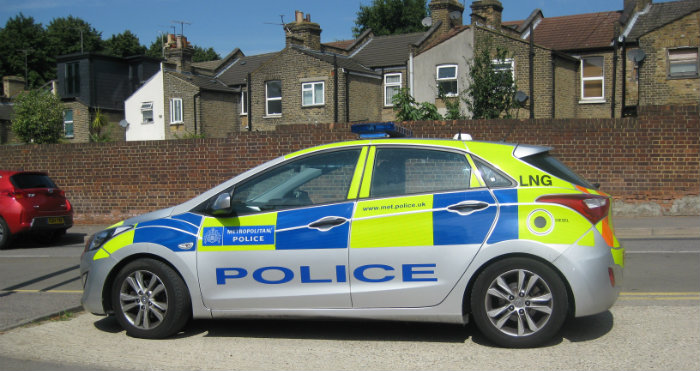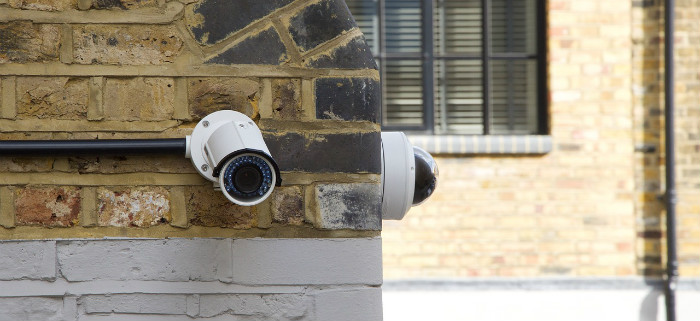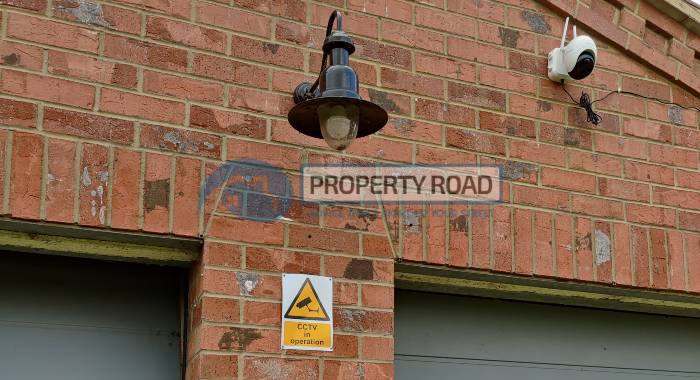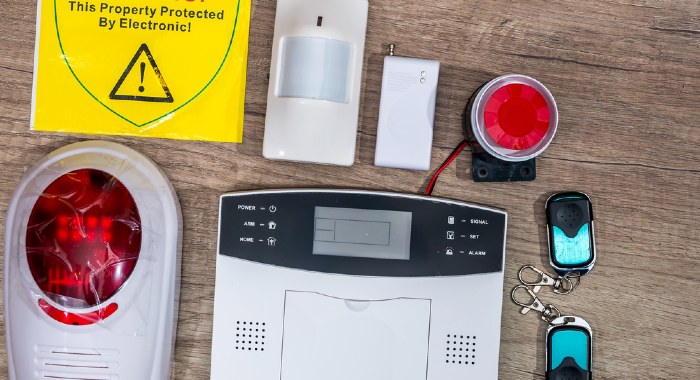Domestic burglary rates may have declined in recent years, but that doesn’t mean you shouldn’t take home security seriously. Intruder alarms are one of the best forms of defence, but what type of burglar alarm is best for UK homes?
It’s a good question, and the answer will depend greatly on your personal preference. Although there are some differences between the types of alarm available, any is better than none.
The three main types of burglar alarm available in the UK are:
- Bells-Only – Emits a loud siren to alert people nearby
- Dialler – Automatically contacts someone when triggered
- Smart – Managed via an app with notifications on your phone
In most cases, versions are available in wired or wireless formats.
Wireless alarms are easier and often cheaper to install but can be more temperamental as they require a good connection between the receivers. That said, modern wireless alarms are good enough to avoid many of the connection issues seen with older models.
Wired alarms can be more costly and disruptive to install but will generally offer fewer problems on an ongoing basis and do not require batteries to be regularly replaced.
Bells-Only Burglar Alarm
These are the standard kind of domestic burglar alarm that have been extremely popular in the UK for many years.
They use a number of sensors (typically door and window sensors combined with motion sensors) to detect potential break-ins. When a possible intruder is detected, a loud siren is sounded inside and out to deter the criminal and alert anyone who is nearby.
Although still effective, the fact such sirens regularly go off for other reasons (such as power cuts or faults) means they are often ignored by neighbours.
Therefore, depending on the area you live in, they may not be the best choice, particularly if you live in a more remote, rural location.
That said, they will still help to deter burglars. Professionally-installed bells-only alarms cost around £500-£1,500 and self-install models cost as little as £200.
This is the kind of alarm we have. It was already installed when we moved in, and we decided not to change it, even though we live in a rural area. Instead, we added security lights and a CCTV system to increase the security.
All these combined will hopefully deter any burglar that passes by.
Dialler Burglar Alarms

These types of burglar alarm work in a very similar way to bells-only ones but instead of sounding an alert and hoping someone nearby responds, a dialler will actually contact someone.
This could be yourself or a friend or family member as you can have the unit automatically call a number of your choice.
There are also dialler alarms available that will notify a security company or even the police when the siren is triggered. You’ll usually have to pay a monthly fee for such a service and so you’ll need to take that into account.
Dialler alarms offer great peace of mind if you spend a lot of time far from home as you know someone will always be alerted when your siren is triggered. They are also a great choice for those who live in more remote, countryside locations.
Costs of dialler alarms are similar to those of bells-only alarms at around £500-£1,500 for professionally-installed systems or £250 and upwards for self-installed versions. If you would like a monitoring service you’ll be looking at around £15-£25 a month extra.
Smart Home-Security Systems
So-called ‘smart’ home-security systems are the next level up from dialler burglar alarms. They will still alert someone when triggered, but this is usually done via notifications being sent to your mobile phone.
They have the added benefit that they can be turned on and off from your phone. Some can even be linked up with other smart home technology such as CCTV cameras, lights, and so on.
For example, some can be set so that when the siren is triggered, your smart lights are turned on all over the house, giving the intruder a fright!
Most smart home-security systems come with plenty of different components to choose from, including; motion sensors, door and window sensors, panic buttons, video cameras, and so on. That means they are easy to customise to your exact needs.
Costs of smart alarms can get quite high if you want a complex installation with lots of different components. However, for a fairly standard one, you’ll only be looking at £200-£500 for a self-install version. Professionally-installed versions usually start at around £1,000.
Burglar Alarm Maintenance Costs

On top of the cost of buying the equipment and getting it installed, you should also consider the regular maintenance your alarm will need.
Your burglar alarm should not be going off regularly, and that means you won’t always know if it’s working correctly. Having it professionally serviced each year will give you peace of mind that it will work IF it is ever called into action.
Regular servicing will also help to prevent a sudden failure which can lead to it going off repeatedly for no real reason until fixed.
An annual service will cost around £50-£90 depending on the type of alarm. Any additional parts or repairs needed may cost extra.
So, What Type Of Burglar Alarm Is Best?
As we mentioned at the start of the article, which type of burglar alarm you choose will come down to personal preference as much as anything. There is certainly not a specific type that is especially best for the UK, generally, alarms work very much the same no matter which country the property is in.
That said, if you live in a rural area without many neighbours, a bells-only alarm may only have limited effect. Therefore, a dialler or smart alarm is likely to be a better option.
In fact, for most people, we would suggest going with a smart alarm as the technology is truly outstanding and still improving all of the time. The fact you can control it from your phone and customise it to your needs means it tends to be the best choice for most homeowners.
However, if you prefer something simpler, that doesn’t require the latest mobile phone handsets, go for a dialler.
How Else To Protect Your Home From Burglars
Having a burglar alarm is a great way to protect your home from burglars, however, it’s not the only option.
Here are some of our favourite methods…
Upgrade Your Locks
When you first move into a property, you should always make changing the locks a priority. However, even if you have lived at a property for a number of years, lock security is always improving.
You should look to upgrade to the latest lock security periodically so that your locks do not become an easy target for burglars. This will help to keep you one step ahead of criminals.
As soon as we move into a new property, the first thing we do is to install security locks. Not only do we make sure any previous owner with a key won’t be able to enter, but it will also make it more difficult for thieves to break in.
Upgrade Your Doors
If your property still uses wooden or uPVC doors, consider upgrading to a composite door.
Composite doors use a mixture of materials including uPVC, wood, steel, and glass to create a door that looks like wood but is stronger and more durable.
Not only do composite doors look better and retain heat better than other types of door, they are also much more solid and harder to break in to for criminals.
Keep Keys Out Of Sight
Thieves can be very inventive when it comes to breaking into properties. One common technique they use is to fashion a hook they can put through the letterbox to pick up nearby keys.
Therefore, make sure you never leave your keys within reach, or sight, or a door or window. Doing so is just tempting the burglar.
It’s also not good practice to leave spare keys hidden around the outside of your property. Invest in an outdoor key safe or leave a spare pair with a trustworthy neighbour instead.
Install CCTV

Closed Circuit Television (CCTV) systems have really come down in price over the last few years. As a result, they are now a very cost-effective method of deterring burglars.
When installing, ensure that they do not leave any vulnerable blind spots and that the cameras themselves are not easy for intruders to tamper with.
You can install both external and internal cameras if you want added peace of mind.
We have installed CCTV in every home we lived in. Not so much because the areas were bad, on the contrary, but for peace of mind. CCTV acts as a deterrent for opportunistic burglars.

The system we have in our current home includes a feature that sends a notification to our phone if the cameras detect movement. While it can be triggered by cats, foxes, insects and even heavy rain or wind, it’s useful because we know we will be alerted.
Another very handy feature is that the cameras have in-built speakers, so you can talk to anyone lurking about, even if you aren’t at home.
We love this feature, because it means we can try and scare off any would-be burglar without having to confront them face-to-face. Our CCTV system is also solar-powered, which means it won’t cost you to run them.
Keep Doors & Windows Locked
It may sound obvious, but it’s surprising how many people do not lock their windows and doors. Even when you are inside the property during the day, an unlocked door or open window is an invitation to criminals.
Of course, that doesn’t mean you can’t open windows when the temperature rises, but do be careful about leaving valuables on display or rooms unattended.
Draw Blinds/Curtains
As it gets dark outside, it becomes easier for passers-by to see into your property if you have the lights or a television on.
Therefore, make a habit of drawing your blinds or curtains as the sun sets in order to keep your valuables out of sight.
It’s a routine we got used to a long time ago. If it’s dark outside, and we enter a room and put the lights on, we automatically draw the blinds. We even do it upstairs, even though it’s unlikely a burglar would try to our home through any of the upstairs windows.
Use Anti-Climb Measures

You can help secure the boundaries of your property with various anti-climb products such as anti-climb paint or anti-climb spikes.
While both are relatively easy for a prepared burglar to overcome, they will help to stop an opportunistic thief from entering your property.
In our previous house, we installed anti-climb spikes on top of our gate into the back garden, as we didn’t want a burglar trying to access our home through the back of the house. They were very easy to install and didn’t cost much.
They gave us peace of mind, which is the most important thing.
Install A Safe
Should a burglar manage to enter your property, you can limit their takings by installing a home safe to store those small valuables.
Placing items such as passports, spare cash, jewellery, and important paperwork in a strong safe attached to a wall or floor is a great way to ensure you protect the most important things to you.
Turn Lights On
Lights being turned on in a property will make a would-be intruder think twice about whether someone may be home.
Plugging lamps into timer switches is an extremely low-cost way to make it appear as if someone is at home. Even better, use new technology such as smart lights to set schedules for your lights and control them from your mobile device.
Use A TV Burglar Deterrent
Similar to having your lights come on according to a timer, you can also buy devices that mimic the colour patterns emitted by a TV.
Called Fake TV Simulators, they cost just a few pounds and are arguably more convincing than a simple light being turned on.
Install A Security Light
Security lights have sensors that activate the light when movement is detected. Generally, burglars will avoid well-lit areas as they’ll be easier to spot by neighbours and passers-by.
Motion-activated security lights are therefore a low-cost, yet effective way to make breaking into your home a less attractive option for burglars.
We have installed security lights in all the areas any would-be burglar could get to. We got solar-powered once first, but especially in winter, they just didn’t get enough energy.
So we would recommend you get security lights that are wired in, to ensure they will work all year round.
Install A Smart Doorbell

Relatively new to the market, smart doorbells like Ring combine a video camera and doorbell with a link to your mobile phone.
When someone rings your doorbell (as burglars may often do to check is anyone is at home), you’ll get a notification on your phone. You can then view who is at the door and even speak to them through an integrated microphone and speaker.
Smart doorbells have the added benefit that you can also answer the door to delivery drivers and provide them instructions when you are not home!
Keep Well-Maintained Boundaries
If you have large hedges at the front of your property, make sure you keep them trimmed. Not only will this let more light into your property, it will also keep it more visible to passers-by and neighbours – something which burglars hate.
It’s also worth repairing broken fences or walls too as a strong and secure perimeter will make it harder for intruders to enter your garden in the first place.
Don’t Advertise Your Holiday!
In today’s world of instant communication and social media, it can be easy to drop your guard and notify potential intruders that your home is unoccupied.
Avoid posting on social media that you are going on holiday and avoid ‘checking in’ to places when away from home. Although you may trust your friends, publicly advertising your home as unoccupied is just not a risk worth taking.




